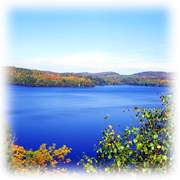 |
History |
A Journey Through TimeToday it takes about an hour by car to reach Hawk Lake from downtown Ottawa. But in 1871, according to Alice Biehler Burich, "the settlers had to travel first to Thurso by steamer, then by wagon or on foot over dusty rutted roads through Mayo, following logging roads over mountains, through bush and swamp, cross rivers, and finally follow the well-worn Indian trails and portages to their destination." * Transportation has changed, but Water's Edge is still and will always be in harmony with nature, denying a more modern world entry to her soothing shores.
Interestingly enough, the first immigrant settlers in the region were neither French, nor English, but German. Mind you, at the time -- 1871-- the term "German" included vast areas of Europe, including Prussia, Pomerania, Poland, Germany, Denmark, Alsace and France. By 1850 lumber was a major area industry. Logs were hand-cut and trimmed by saw and axe, and floated down river on the spring floodwater in what was called "the drive." From 1857 to 1879, men made logs for $7 per month. The strenuous labour did not prevent the men from having a good time however, and it is recorded that the Roman Catholic bishop sent priests to the shanties to mitigate rowdy influences: "The normally boisterous, noisy camp quieted to a hush as the good Father heard confessions."*
Still, the natural domain of Hawk Lake refused to give up ground. The first automobile to break the peaceful quiet of Mulgrave Township arrived in September 1908 with a load of fishermen -- and promptly stalled on a mountain road. The fishermen finished their trip on foot while their chauffeur worked for hours to repair the vehicle. The vehicle was finally pulled up the hill the following morning by a team of horses. Later, the first car to successfully negotiate MacKinnon's Hill was a six-cylinder Norwalk driven by Mr. E.M. Farrow of Ottawa who "received quite an ovation from an assembled crowd of sightseers." * While the roads are paved and easily accessible today, and modern facilities and creature comforts abound, Water’s Edge refuses to give up the natural beauty that makes it a blissful sanctuary. Come and make your own historic mark in this paradise, for you and your descendants to take pleasure in. * For further information about the Township of Mulgrave-Derry, we give thanks to and highly recommend that you consult the very informative and entertaining Olden Days: A History of German Settlement in the Township of Mulgrave-Derry, Quebec 1850-1890, by Alice Biehler Burich, Chesley House Publications, Quyon, Quebec, 1990. WatersEdge Estate awaits you. Please call Richard at 1-416-809-0909 (1-888-232-2088 in North America outside of Toronto) or eMail him and we'd be delighted to show you the property.
|
 Water’s
Edge surrounds Hawk Lake, which is near the north end of the
Township of Mulgrave-Derry. As late as 1850, the First Nations
inhabited the shores of Hawk Lake, and other lakes in the
region. Their camps were gradually displaced as lumbermen and
farmers moved into the area.
Water’s
Edge surrounds Hawk Lake, which is near the north end of the
Township of Mulgrave-Derry. As late as 1850, the First Nations
inhabited the shores of Hawk Lake, and other lakes in the
region. Their camps were gradually displaced as lumbermen and
farmers moved into the area. Hawk
Lake Lodge was opened in July 1906 by Mr. and Mrs. H.C. Yank.
Mr. Yank stocked the lake himself with three-inch long bass,
which by 1925 had grown so rapidly that bass 3.5 pounds in
weight were not uncommon.
Hawk
Lake Lodge was opened in July 1906 by Mr. and Mrs. H.C. Yank.
Mr. Yank stocked the lake himself with three-inch long bass,
which by 1925 had grown so rapidly that bass 3.5 pounds in
weight were not uncommon.